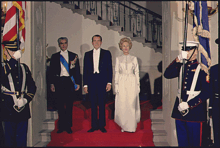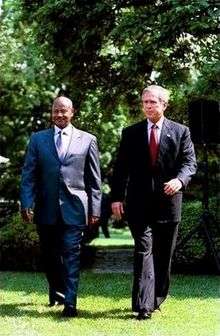Criticism of the United States government
Criticism of the United States government encompasses a wide range of sentiments about the actions and policies of the United States.
Foreign policy

The U.S. has been criticized for making statements supporting peace and respecting national sovereignty, but while carrying out military actions such as in Grenada, fomenting a civil war in Colombia to break off Panama, and Iraq. The U.S. has been criticized for advocating free trade but while protecting local industries with import tariffs on foreign goods such as lumber[2] and agricultural products. The U.S. has also been criticized for advocating concern for human rights while refusing to ratify the Convention on the Rights of the Child. The U.S. has publicly stated that it is opposed to torture, but has been criticized for condoning it in the School of the Americas. The U.S. has advocated a respect for national sovereignty but has supported internal guerrilla movements and paramilitary organizations, such as the Contras in Nicaragua.[3][4] The U.S. has been criticized for voicing concern about narcotics production in countries such as Bolivia and Venezuela but doesn't follow through on cutting certain bilateral aid programs.[5] However, some defenders argue that a policy of rhetoric while doing things counter to the rhetoric was necessary in the sense of realpolitik and helped secure victory against the dangers of tyranny and totalitarianism.[6]
The U.S. has been criticized for supporting dictatorships with economic assistance and military hardware.
The U.S. has been criticized by Noam Chomsky for opposing nationalist movements in foreign countries, including social reform.[7][8]
President Bush has been criticized for neglecting democracy and human rights by focusing exclusively on an effort to fight terrorism.[9][9] The U.S. was criticized for alleged prisoner abuse at Guantánamo Bay, Abu Ghraib in Iraq, and secret CIA prisons in eastern Europe, according to Amnesty International.[10] In response, the U.S. government claimed incidents of abuse were isolated incidents which did not reflect U.S. policy.
Some critics charge that U.S. government aid should be higher given the high levels of gross domestic product.[11][12] The U.S. pledged 0.7% of GDP at a global conference in Mexico.[13][14] However, since the U.S. grants tax breaks to nonprofits, it subsidizes relief efforts abroad,[15] although other nations also subsidize charitable activity abroad.[16] Most foreign aid (79%) came not from government sources but from private foundations, corporations, voluntary organizations, universities, religious organizations and individuals. According to the Index of Global Philanthropy, the United States is the top donor in absolute amounts.[17]

The U.S. has also been criticized for failure to support the 1997 Kyoto Protocol.[18][19]
In 1930-1940 the USA collaborated with Stalin regime by building around 1500 factories in the USSR using a slave labor of political prisoners.[20] The USA also covered up genocide of East Ukraine in 1932-1933, that killed between 4 and 6 millions of Ukrainians and in the midst of it established a diplomatic relationship with the USSR.
There has been sharp criticism about the U.S. response to the Holocaust: That it failed to admit Jews fleeing persecution from Europe at the beginning of World War II, and that it did not act decisively enough to prevent or stop the Holocaust.[21][22]
Critic Robert McMahon thinks Congress has been excluded from foreign policy decision making, and that this is detrimental.[23] Other writers suggest a need for greater Congressional participation.[24]
Jim Webb, former Democratic senator from Virginia and former Secretary of the Navy in the Reagan administration, believes that Congress has an ever-decreasing role in U.S. foreign policy making. September 11, 2001 precipitated this change, where "powers quickly shifted quickly to the Presidency as the call went up for centralized decision making in a traumatized nation where, quick, decisive action was considered necessary. It was considered politically dangerous and even unpatriotic to question this shift, lest one be accused of impeding national safety during a time of war."[25]
Since that time, Webb thinks Congress has become largely irrelevant in shaping and executing of U.S. foreign policy. He cites the Strategic Framework Agreement (SFA), the U.S.-Afghanistan Strategic Partnership Agreement, and the 2011 military intervention in Libya as examples of growing legislative irrelevance. Regarding the SFA, "Congress was not consulted in any meaningful way. Once the document was finalized, Congress was not given the opportunity to debate the merits of the agreement, which was specifically designed to shape the structure of our long-term relations in Iraq" (11). "Congress did not debate or vote on this agreement, which set U.S. policy toward an unstable regime in an unstable region of the world."[25] The Iraqi Parliament, by contrast, voted on the measure twice. The U.S.-Afghanistan Strategic Partnership Agreement is described by the Obama Administration has a "legally binding executive agreement" that outlines the future of U.S.-Afghan relations and designated Afghanistan a major non-NATO ally. "It is difficult to understand how any international agreement negotiated, signed, and authored only by our executive branch of government can be construed as legally binding in our constitutional system," Webb argues.[25]
Finally, Webb identifies the U.S. intervention in Libya as a troubling historical precedent. "The issue in play in Libya was not simply whether the president should ask Congress for a declaration of war. Nor was it wholly about whether Obama violated the edicts of the War Powers Act, which in this writer's view he clearly did. The issue that remains to be resolved is whether a president can unilaterally begin, and continue, a military campaign for reasons that he alone defines as meeting the demanding standards of a vital national interest worth of risking American lives and expending billions of dollars of taxpayer money."[25] When the military campaign lasted months, President Barack Obama did not seek approval of Congress to continue military activity.[25]
Domestic policy



Spying and surveillance
Government structure
Executive branch
Presidential incompetency
One difficulty of the American government is that the lack of oversight for Presidents offers no safeguards for presidential incompetency. For example, Barack Obama has been increasingly criticized for his expansive views on executive powers and mismanaging of several situation, including the Syrian Civil War.[26] In addition, George W. Bush, who was criticized as entering the Iraq war too hastily, had no reproach for his advocacy of the war.[18][27][28][29][29][29][30][31][32][32]
George H. W. Bush was criticized for stopping the first Iraq War too soon without finishing the task of capturing Saddam Hussein.[29][29] Foreign policy expert Henry Kissinger criticized Jimmy Carter for numerous foreign policy mistakes including a decision to admit the ailing Shah of Iran into the United States for medical treatment, as well as a bungled military mission to try to rescue the hostages in Tehran.[33][33]
Virtually every President in modern history has been criticized for incompetency in some fashion. However, there are little to no mechanisms in place to provide accountability. Since the only way to remove an incompetent president is with the rather difficult policy of impeachment, it is possible for a marginally competent or incompetent president to stay in office for four to eight years and cause great mischief.[34][35]
Over-burdened presidency
Presidents have not only foreign policy responsibilities, but sizable domestic duties too. In addition, the presidency is the head of a political party. As a result, it is tough for one person to manage disparate tasks, in one view. Many believe that this overburdened duty of presidents allows for incompetency in government.[36]
Presidents may lack experience
Since the constitution requires no prior experience in diplomacy, government, or military service, it is possible to elect presidents with scant foreign policy experience. Clearly the record of past presidents confirms this, and that presidents who have had extensive diplomatic, military, and foreign policy experience have been the exception, not the rule. In recent years, presidents had relatively more experience in such tasks as peanut farming, acting and governing governorships than in international affairs. It has been debated whether voters are sufficiently skillful to assess the foreign policy potential of presidential candidates, since foreign policy experience is only one of a long list of attributes in which voters tend to select candidates.[18] President Obama has been widely criticized as too inexperienced for the job, having only served in government for three years before his presidential election. However, party leadership and donors were adamant in their advocacy due his broad appeal, leading to a nominee with little experience.[37]
In addition, an increasing difficulty for providing well-versed Presidents is that the American people in recent years are, in increasing numbers, more distrustful of their government and longterm, career politicians. As such, inexperienced candidates often perform better.[38]
Excessive authority of the presidency
In contrast to criticisms that presidential attention is divided into competing tasks, some critics charge that presidents have too much power, and that there is the potential for tyranny or authoritarianism. Many presidents have circumvented the national security decision-making process, including Obama, Bush, Clinton, and Reagan, as well as others historically.[18] Many critics see a danger in too much executive authority.[39][40][41][42][43][44]
See also
- Criticism of the Iraq War
- American exceptionalism
- American Interventions in the Middle East
- American Empire
- Assassination attempts on Fidel Castro
- Bush Doctrine
- Carter Doctrine
- China Containment Policy
- Containment
- Contents of the United States diplomatic cables leak (United States)
- Détente
- Dollar hegemony
- Foreign Military Sales
- Foreign policy of the Barack Obama administration
- Foreign policy of the United States
- History of the Central Intelligence Agency
- Human rights in the United States
- Human Rights Record of the United States
- Inverted totalitarianism
- Monroe Doctrine
- NATO
- Nixon Doctrine
- Powell Doctrine
- President of the United States
- Reagan Doctrine
- Roosevelt Corollary
- Truman Doctrine
- United States and state terrorism
- United States and state-sponsored terrorism
- United States and the United Nations
- United States Agency for International Development
- United States, Chanceries of Foreign Governments
- United States diplomatic cables leak
- United States Foreign Military Financing
- United States military aid
- Zbigniew Brzezinski
Criticism of United States government agencies
- Criticism of the Food and Drug Administration
- Criticism of the United States Patent and Trademark Office
- Criticism of the IRS
- Criticism of the Federal Aviation Administration
- Criticism of the United States Department of Housing and Urban Development
- Criticism of the Department of Homeland Security
- Criticism of the Drug Enforcement Administration
- Criticism of the Federal Emergency Management Agency
- Criticism of the Federal Reserve
- Criticism of United States Border Patrol
Further reading
- Bacevich, Andrew J. The Limits of Power: The End of American Exceptionalism. New York: Metropolitan Books, 2008.
- Blum, William. America's Deadliest Export: Democracy : the Truth About US Foreign Policy and Everything Else. Halifax, N.S.: Fernwood Pub, 2013.
- Chomsky, Noam, and David Barsamian. Imperial Ambitions: Conversations on the Post-9/11 World. New York: Metropolitan Books, 2005.
- Cramer, Jane K., and A. Trevor Thrall. Why Did the United States Invade Iraq? Hoboken: Taylor & Francis, 2011.
- Davidson, Lawrence. Foreign Policy, Inc.: Privatizing America's National Interest. Lexington: University Press of Kentucky, 2009.
- Eland, Ivan. The Empire Has No Clothes: U.S. Foreign Policy Exposed. Oakland, Calif: Independent Institute, 2004. ISBN 0-945999-98-4
- Esparza, Marcia; Henry R. Huttenbach; Daniel Feierstein, eds. State Violence and Genocide in Latin America: The Cold War Years (Critical Terrorism Studies). Routledge, 2011. ISBN 0415664578
- Foner, Philip Sheldon. The Spanish-Cuban-American War and the Birth of American Imperialism, 1895-1902. New York: Monthly Review Press, 1972.
- Gould, Carol. Don't Tread on Me: Anti-Americanism Abroad. New York: Encounter Books, 2009.
- Grandin, Greg. The Last Colonial Massacre: Latin America in the Cold War. University Of Chicago Press, 2011. ISBN 9780226306902
- Immerman, Richard H. Empire for Liberty: A History of American Imperialism from Benjamin Franklin to Paul Wolfowitz. Princeton: Princeton University Press, 2010.
- Lichtblau, Eric. The Nazis Next Door: How America Became a Safe Haven for Hitler's Men. Houghton Mifflin Harcourt, 2014. ISBN 0547669194
- Marsden, Lee. For God's Sake: The Christian Right and US Foreign Policy. London: Zed Books, 2008.
- Maier, Charles S. Among Empires: American Ascendancy and Its Predecessors. Cambridge, MA: Harvard University Press, 2006.
- Mearsheimer, John J., and Stephen M. Walt. The Israel Lobby and US Foreign Policy. New York, NY: Farrar, Straus and Giroux, 2007.
- Zinn, Howard. A People's History of the United States: 1492-Present. New York: Harper Collins, 2003.
References
- ↑ Shaking Hands with Saddam Hussein: The U.S. Tilts toward Iraq, 1980-1984. National Security Archive, Electronic Briefing Book No. 82. Ed. by Joyce Battle, February 25, 2003.
- ↑ "Canada attacks U.S. on wood tariffs". BBC. 2005-10-25. Retrieved 24 March 2008.
- ↑ Satter, Raphael (2007-05-24). "Report hits U.S. on human rights". Associated Press (published on The Boston Globe). Retrieved 2007-05-29.
- ↑ "World Report 2002: United States". Human Rights Watch. Retrieved 2007-06-02.
- ↑ "U.S. keeps Venezuela, Bolivia atop narcotics list". Reuters. September 16, 2009. Retrieved 2009-12-21.
- ↑ Bootie Cosgrove-Mather (February 1, 2005). "Democracy And Reality". CBS News. Retrieved 2009-12-21.
- ↑ Chomsky, Noam (2006-03-28). "The Israel Lobby?". ZNet. Retrieved 2009-01-13.
- ↑ "Noam Chomsky on America's Foreign Policy". PBS. Retrieved 16 April 2014.
- 1 2 Stephanie McCrummen (February 22, 2008). "U.S. Policy in Africa Faulted on Priorities: Security Is Stressed Over Democracy". Washington Post. Retrieved 2009-12-22.
- ↑ "Report 2005 USA Summary". Amnesty International. 2005. Archived from the original on 2008-05-16. Retrieved 2009-12-24.
- ↑ "US and Foreign Aid Assistance". Global Issues. 2009. Retrieved 2009-12-24.
- ↑ "US and Foreign Aid Assistance". Global Issues. 2009. Retrieved 2009-12-24.
- ↑ "UN Millennium Project–Fast Facts". UNDP. 2005. Archived from the original on December 10, 2008. Retrieved 2009-12-24.
- ↑ "UN Millennium Project–Fast Facts". OECD. 2007. Archived from the original on 2008-11-23. Retrieved 2009-12-24.
- ↑ "Papers". ssrn. 2007. Retrieved 2009-12-24.
- ↑ "U.S. and Foreign Aid Assistance". Global Issues. 2007. Retrieved 2009-12-24.
- ↑ "Foreign aid". America.gov. 2007-05-24. Archived from the original on 2009-12-23. Retrieved 2009-12-24.
- 1 2 3 4 Dana Milbank (October 20, 2005). "Colonel Finally Saw Whites of Their Eyes". Washington Post. Retrieved 2009-12-21.
- ↑ "Bush + Blair = Buddies". CBS News. July 19, 2001. Retrieved 2009-12-22.
- ↑ "How We Built the Soviet Might".
- ↑ "FRANKLIN DELANO ROOSEVELT". United States Holocaust Memorial Museum. Retrieved 10 January 2014.
- ↑ Joseph J. Plaud, BCBA. "Historical Perspectives on Franklin D. Roosevelt, American Foreign Policy, and the Holocaust". Franklin D. Roosevelt American Heritage Center and Museum. Retrieved 10 January 2014.
- ↑ Robert McMahon; Council on Foreign Relations (December 24, 2007). "The Impact of the 110th Congress on U.S. Foreign Policy". Washington Post. Retrieved 2009-12-21.
- ↑ Jessica Tuchman Mathews (October 10, 2007). "Six Years Later: Assessing Long-Term Threats, Risks and the U.S. Strategy for Security in a Post-9/11 World". Carnegie Endowment for International Peace. Retrieved 2009-12-22.
- 1 2 3 4 5 Webb, Jim (March–April 2013). "Congressional Abdication". The National Interest (124). Retrieved 11 March 2013.
- ↑ "You Can't Keep Up with Obama's Incompetence, Corruption, and Hyperactivity". National Review. Retrieved March 23, 2016.
- ↑ Fareed Zakaria (March 14, 2009). "Why Washington Worries–Obama has made striking moves to fix U.S. foreign policy—and that has set off a chorus of criticism.". Newsweek. Retrieved 2009-12-18.
- ↑ Amy Chua (October 22, 2009). "Where Is U.S. Foreign Policy Headed?". The New York Times: Sunday Book Review. Retrieved 2009-12-21.
- 1 2 3 4 5 James M. Lindsay (book reviewer) (March 25, 2007). "The Superpower Blues: Zbigniew Brzezinski says we have one last shot at getting the post-9/11 world right. book review of "Second Chance" by Zbigniew Brzezinski". The Washington Post. Retrieved 2009-12-21.
- ↑ Raphael G. Satter, Associated Press (2008-09-15). "Report: John Le Carre says he nearly defected to Russia". USA Today. Retrieved 2009-12-22.
- ↑ Paul Magnusson (book reviewer) (2002-12-30). "Is Democracy Dangerous? Book review of: WORLD ON FIRE–How Exporting Free Market Democracy Breeds Ethnic Hatred and Global Instability; By Amy Chua". Business Week. Retrieved 2009-12-21.
- 1 2 Roger Cohen (April 5, 2006). "Freedom May Rock Boat, but It Can't Be Selective". The New York Times. Retrieved 2009-12-21.
- 1 2 "Nation: Kissinger: What Next for the U.S.?". Time Magazine. May 12, 1980. Retrieved 2009-12-21.
- ↑ Sanford Levinson (September 17, 2008). "Constitution Day Essay 2008: Professor Sanford Levinson examines the dictatorial power of the Presidency". University of Texas School of Law.
- ↑ Sanford Levinson (LA Times article available on website) (October 16, 2006). "Our Broken Constitution". University of Texas School of Law -- News & Events. Retrieved 2009-10-10.
- ↑ Zbigniew Brzezinski (2001-10-20). "From Hope to Audacity: Appraising Obama's Foreign Policy (I)". Foreign Affairs. Retrieved 2010-01-11.
- ↑ "The big question about Barack Obama". USA Today. Retrieved March 23, 2016.
- ↑ "Amateurs in the Oval Office". The Atlantic. Retrieved March 23, 2016.
- ↑ Nelson, Dana D. (2008). Bad for Democracy: How the Presidency Undermines the Power of the People. Minneapolis, Minnesota: University of Minnesota Press. p. 248. ISBN 978-0-8166-5677-6.
- ↑ Sirota, David (August 22, 2008). "The Conquest of Presidentialism". The Huffington Post. Retrieved 2009-09-20.
- ↑ David Sirota (August 22, 2008). "Why cult of presidency is bad for democracy". San Francisco Chronicle. Retrieved 2009-09-20.
- ↑ David Sirota (January 18, 2009). "U.S. moving toward czarism, away from democracy". San Francisco Chronicle. Retrieved 2009-09-21.
- ↑ Sanford Levinson (February 5, 2009). ""Wartime Presidents and the Constitution: From Lincoln to Obama" -- speech by Sanford Levinson at Wayne Morse Center". Wayne Morse Center for Law and Politics. Retrieved 2009-10-10.
- ↑ Anand Giridharadas (September 25, 2009). "Edging Out Congress and the Public". New York Times. Retrieved 2009-10-10.

.svg.png)